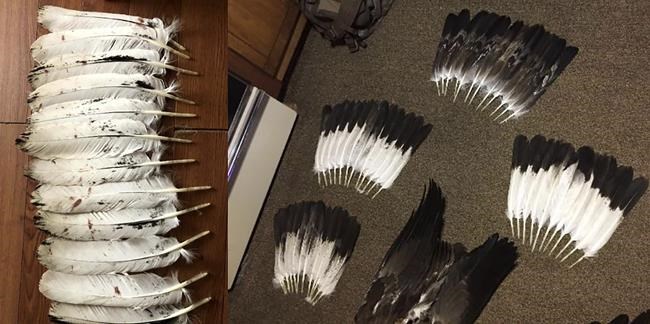
This image provided by the US Attorney for the District of Montana from a court document shows eagle feathers from birds that a Washington state man is accused of shooting to sell their parts on the black market. The defendant is scheduled to plead guilty to federal wildlife trafficking charges on Wednesday, March 20, in Missoula, Mont. (Courtesy of the US Attorney for the District of Montana via AP)
Republished March 20, 2024 - 2:58 PM
Original Publication Date March 19, 2024 - 9:46 PM
MISSOULA, Mont. (AP) — A Washington state man accused of helping kill thousands of birds pleaded guilty in federal court on Wednesday to shooting eagles on an American Indian reservation in Montana and selling their feathers and body parts on the black market.
Travis John Branson pleaded guilty to conspiracy, wildlife trafficking and two counts of trafficking federally protected bald and golden eagles, under a plea deal reached last month with government attorneys.
The prosecution over eagles killed on the Flathead Indian Reservation underscores the persistence of a thriving illegal trade in eagle feathers despite a law enforcement crackdown in the 2010s that netted dozens of criminal indictments across the U.S. West and Midwest. Feathers and other parts of eagles are widely used by Native Americans in ceremonies and during powwows.
Court documents quote Branson saying in a January 2021 text that he was going on a “killing spree” to obtain eagle tails. Branson and a second defendant, Simon Paul, killed approximately 3,600 birds, including eagles on the Flathead reservation and elsewhere, according to a December indictment.
Federal authorities have not disclosed how most of those birds were killed, nor where else the killings happened, and the issue was not discussed during Wednesday's hearing.
Branson, of Cusick, Washington, sold an unidentified purchaser two sets of golden eagle tail feathers — highly prized among many Native American tribes — for $650 in March 2021, according to prosecutors.
Less than two weeks later, law enforcement stopped him on the reservation and found in his vehicle the feet and feathers of a golden eagle he had shot near Polson, Montana, which is on the reservation according to court filings that included a photo of the bird's severed feet with their massive talons. The bird's carcass had been “cleaned” by the second defendant, Paul, and was found in a nearby field, prosecutors wrote.
Multiple phones seized by authorities during the stop yielded photos and text messages that described “the shooting, killing and ultimate selling of bald and golden eagles throughout the United States,” prosecutors said.
Branson acknowledged in response to questions from Magistrate Judge Kathleen DeSoto that he “conspired to take and sell migratory birds,” which is illegal under federal law. He also said he he grew up with his co-defendant and was originally from the Polson area.
DeSoto scheduled sentencing for July 31 before U.S. District Judge Dana Christensen.
Branson was not taken into custody pending his sentencing and he made no public comments after the hearing. His attorney, Assistant Federal Defender Andrew Nelson, declined comment.
The plea deal also calls for Branson to pay restitution for damages. An amount has not been set but tribal officials hope some of that money comes to the Flathead reservation, home to the Confederated Salish and Kootenai Tribes.
“My hope is that we can see some of those monies because our resources were damaged,” said Rich Janssen, Natural Resources Department Head for the tribes. “And frankly, it was our wardens that did a lot of the legwork that brought this case forward to the federal agencies that finally got the prosecution.”
Paul, of St. Ignatius, Montana, remains at large. A federal judge issued an arrest warrant for Paul in December when he did not show up for an initial court hearing.
The indictment described Branson and Paul trafficking golden and bald eagles or their parts on at least 11 occasions between December 2020 and the stop of Branson by law enforcement on March 13, 2021.
Court filings suggest the illegal activity went on much longer. They outline a conspiracy that began in 2015 and involved other people who killed eagles on the Flathead Reservation but have not been publicly identified.
In a 2016 text message quoted by prosecutors, Branson appeared to acknowledge that shipping eagles internationally was illegal, adding, “I just get em for 99 cents...price of a bullet.”
In another text exchange, Branson was negotiating an eagle feather sale when he allegedly wrote, “I don’t get em for free though....out hear (sic) committing felonies,” according to the court filings.
He faces up to five years in prison and a $250,000 fine at sentencing on the most serious charge, conspiracy. Under the plea deal, lawyers for the U.S. Attorney's Office in Montana said they would seek to dismiss additional trafficking charges and would recommend a sentencing guideline reduction that could lessen the severity of Branson’s punishment.
The criminal case comes almost a decade after the launch of a multi-state U.S. Fish and Wildlife Service trafficking investigation — dubbed “Operation Dakota Flyer” — that led to charges against 35 defendants and the recovery of more than 150 eagles, 100 hawks and owls and 20 species of other protected birds seized or bought by authorities in undercover purchases, according to federal officials.
Federally recognized tribes can apply for permits with the U.S. Fish and Wildlife Service to take a bald or golden eagle for religious purposes, and enrolled tribal members can apply for feathers and other bird parts from the National Eagle Repository in Colorado and non-government repositories in Oklahoma and Phoenix. There’s a yearslong backlog of requests at the National Repository and researchers say the high demand is fueling the black market for eagle parts.
___
Brown reported from Billings, Mont.
News from © The Associated Press, 2024